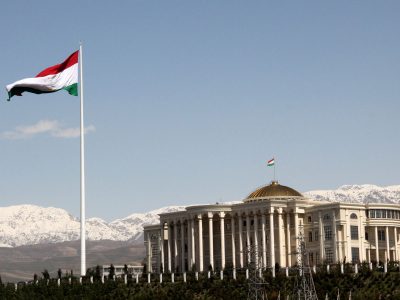Security services in Tajikistan will soon have the right to monitor citizens’ online activities, by keeping detailed records of SMS and mobile messages, social media comments, and anyone who visits “undesirable” websites.
This week, the parliamentarians passed legislation that grants the country's security services the right to monitor and control citizens’ online activities, as part of a set of amendments to existing criminal law.
These have not yet been made public, but local news website Asia Plus has obtained some details from experts and parliamentarians. According to the website, two special cyber security units in the Ministry of Internal Affairs will be responsible for following Tajiks online.
Local MP Saidjafar Ismonov told Asia Plus that for an “inappropriate comment,” a commenter can be fined. Comments considered damaging to someone's personal honor or undermining national security can be punished with a jail term of two years or more. What exactly qualifies as an “undesirable website” or an “inappropriate comment” is not clear.
A prominent supporter of the legislation is Ozoda Rahmon, who in addition to being the president's daughter, serves as his chief of staff and as a senator in the Majlisi Milli, the upper house of the country’s parliament.
Tajik MP Jurakhon Mahmadzoda first introduced the amendments and justified the call by claiming, without offering evidence, that more than 80% of Tajiks who have internet access visit “undesirable websites belonging to extremists and terroristic organizations.”
Internet technology expert Muhammadi Ibodullev told RFERL's Tajik service that Mahmazoda's claim might have stemmed from a very basic misunderstanding. In one recent conference held in the capital Dushanbe, a speaker said that “80% of Tajik members of ISIS [the fundamentalist militant group that controls pockets of territory in Iraq, Syria and Afghanistan] have been recruited by others, including via the Internet.”
Those are two very different statistics, but MP Mahmadzoda was quick to offer a solution to what he sees as an internet out of control.
Reacting to the news, Facebook users expressed concerns over how “undesirable websites” might be determined:
Без опубликованного списка могут интерпретировать что угодно. Зайдешь на сайт, выйдешь. А кто-то после тебя там напишет что-то новое а ты там был…
Without a public list [of websites] they can interpret [undesirable] however they want. You visit a site and leave it. But afterwards the website might publish something new, and you were there.
The legislation also represents a shift in strategy for the Tajik government, which has historically opted to censor controversial websites and services. Now, rather than preventing citizens from accessing online materials, they will use these sites as vehicles for monitoring citizens’ activities.
Indeed, for several years, Tajikistan periodically blocked access to popular social media, such as Russian Odnoklassniki and VKontakte, Facebook, YouTube, and local top news websites. These sites were usually blocked around times of heightened political tension or public unrest, such as military clashes in some parts of country. YouTube was blocked for a week in 2013 after a video of President Emomali Rahmon dancing at his son's wedding went viral.
After a few weeks or months, access was typically restored amid international pressure. But in more recent years, all these websites were blocked wholesale, for no apparent or specific reason.
The government rarely admits that it orders web blocking, but internet service providers have repeatedly confirmed regular ‘verbal’ orders from authorities.
The constant lack of access to social and news platforms has led to widespread use of virtual private networks that have become the main means by which Tajik netizens access blocked websites, and especially social media.
But with the government's new legislation, this may change. It appears that authorities have elected to soon make social media accessible and to use them as a way to monitor citizens, rather than controlling the public by keeping these websites out of reach.




